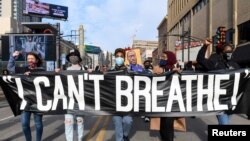A Minneapolis police officer was swiftly fired and charged with murder after bystander video showed him pressing his knee into George Floyd's neck, ignoring the Black man's cries that he couldn't breathe. But even with that powerful footage, legal experts say the case isn't a slam dunk for the prosecution.
Jury selection begins Monday in Derek Chauvin's trial, which is expected to come down to two key questions: Did Chauvin's actions cause Floyd's death, and were his actions reasonable?
"It's hard not to watch the video and conclude that the prosecutors will not have any trouble with this case," said Susan Gaertner, the former head prosecutor in neighboring Ramsey County. "But it's not that simple."
Floyd was declared dead May 25 after Chauvin, who is white, pressed his knee against Floyd's neck for about nine minutes, holding his position even after Floyd went limp as he was handcuffed and lying on his stomach. Floyd's death sparked sometimes violent protests in Minneapolis and beyond and led to a nationwide reckoning on race.
Chauvin is charged with second-degree unintentional murder and second-degree manslaughter.
Three other officers, all of whom also were fired, face trial in August on charges of aiding and abetting the second-degree murder and manslaughter counts.
The second-degree murder charge requires prosecutors to prove Chauvin caused Floyd's death while committing or trying to commit a felony — in this case, third-degree assault. The manslaughter charge has a lower bar, requiring proof that Chauvin caused Floyd's death through negligence that created an unreasonable risk, and consciously took the chance of causing severe injury or death.
In addition, prosecutors are also hoping to reinstate a third-degree murder charge against Chauvin after a ruling from a panel of appeals court judges. Last fall, the trial judge in Chauvin’s case dismissed the third-degree charge, which has traditionally been used in Minnesota to prosecute suspects who acted dangerously but did not have the intention to harm a specific person. A recent court ruling in an unrelated case may reshape that interpretation in that it may be applied in a case in which a suspect’s actions are dangerous to a single person.
Exactly how Floyd died is shaping up as a major flashpoint of the trial.
Chauvin's attorney, Eric Nelson, argues in court documents that Floyd likely died from fentanyl he consumed, or a combination of fentanyl, methamphetamine and underlying health conditions — not as a result of Chauvin's knee on his neck.
But Hennepin County Judge Peter Cahill wrote last fall that for the second-degree murder charge, prosecutors don't have to prove that Chauvin was the sole cause of Floyd's death — only that his conduct was a "substantial causal factor."
Still, defense attorneys who are not connected to the case say all Nelson has to do is raise reasonable doubt in a single juror's mind.
"Although he had him pinned under his knee and he's yelling 'I can't breathe! I can't breathe!' there's an argument that (Chauvin) wasn't exerting pressure and his inability to breathe was due to the drugs in his system or something to that effect, or his anxiety," said F. Clayton Tyler, a prominent local defense attorney.
Defense attorneys say it also may not be easy to establish that Chauvin was committing the felony of assault — as required for the second-degree murder charge in this case. Chauvin is authorized to use force as a police officer, and his attorneys will argue that his use of force against Floyd was reasonable.
Gaertner, the former head prosecutor, said the defense will face a challenge of trying to move the jury's focus off the video and the strong emotion it generates. They will instead try to focus on the medical evidence and Floyd's underlying conditions while trying to portray the circumstances of the arrest as "justifiable, consistent with police norms," she said.
Chauvin will likely have to take the stand to explain why he felt he had to hold Floyd down for so long, experts say. He may say he followed his training, and that it was necessary because his experience with other suspects under the influence of drugs shows that things can suddenly become erratic and dangerous.
Tyler said if he were a prosecutor, he would use a still shot of Chauvin's expressionless face from that video and keep it in view for the jury to see.
"I mean, the look on his face," Tyler said. "If I was prosecuting this case, I have to say, I'd have that picture up there. You want to show indifference? Just look at him."







